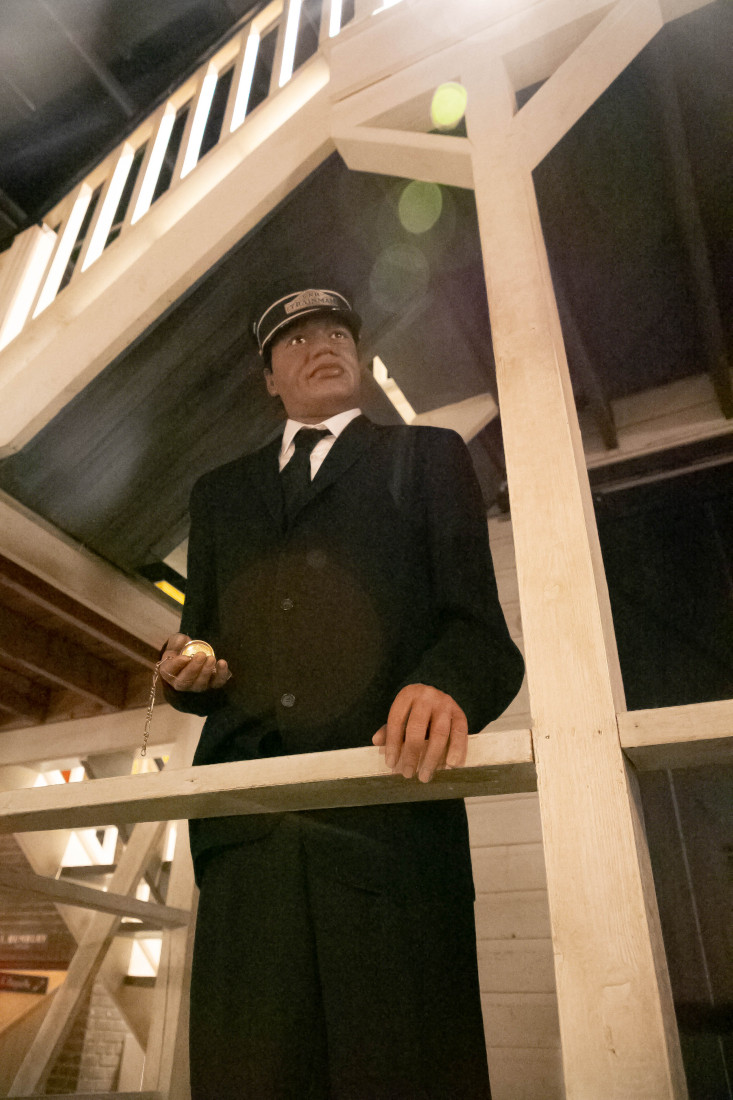Virtual field trips for Black History Month
Manitoba Museum and Black History Manitoba collaborate to educate students
A new mannequin featured in the Manitoba Museum’s Old Winnipeg exhibit, inspired by John Arthur Robinson, a local labour organizer and Black porter for the Canadian Pacific Railway. (Photo by Leigh Lugosi)
Anya Moodie-Foster, the learning and engagement supervisor at the Manitoba Museum, is one of the people working on and running the Black History Month Virtual Field Trips. She usually works with school groups, but she has also been a part of a number of new programs at the museum.
“Recently, we started a series we’ve been calling Community Voices, where we’ve been working with different communities,” she says. “So, for example, in the fall, we had a program under the Community Voices banner where we talked about LGBTQ2+ history. And then we sort of brought the Black History public programs under that banner, as well.”
The current Virtual Field Trips are meant to help educate school groups across the province over a livestream, but they have also been attended by classes across the country.
Even though Black Canadians have been involved in the shaping of Canadian history and identity at least since Mathieu Da Costa, a navigator and interpreter, arrived in the early 1600s, Black Canadians have largely been ignored in Canada’s school curricula.
Very few people even know or acknowledge that African people were in fact enslaved here, and not just by our southern neighbours.
When the Black Lives Matter movement grew in 2019 and 2020 after George Floyd, Ahmaud Arbery and Breonna Taylor were killed, organizations across the country took a look inward at what they needed to change.
“I think, like many organizations, the pandemic – which stopped regular activities – and things like the Black Lives Matter movement really have caused people to look and say, ‘You know, what are we doing? Are we telling these stories?” Moodie-Foster says.
Moodie-Foster says the Black Lives Matter movement also caused teachers to look at what stories they are including and not including in their lessons.
“We’re really happy to be part of this new effort that’s happening in classrooms across Manitoba,” she says.
Moodie-Foster explains that the programs are meant for a general audience and are “family-friendly.” Kids and adults alike can learn from the field trips.
“Previous generations didn’t have Black history in their schooling. And there are stories that they may not have heard of that students today are exploring more,” she says. “People tend to be much more familiar with American Black history, and not so much about Canadian stories.”
The Virtual Field Trips are hosted by Moodie-Foster and Andre Sheppard, a member of Black History Manitoba. Each program consists of a PowerPoint presentation, polls and questions that can be typed into the virtual chat.
The collaboration between the Manitoba Museum and Black History Manitoba has been in the works since 2019.
“We decided that a virtual field trip was ... the best way for us to partner,” Moodie-Foster says. “We’ve been doing these programs for about a year. And we’re really, really pleased with the response. Last year, we probably had about 3,000 people or so see our programs. This year, we’re hoping to get beyond 5,000.”
Nadia Thompson, the chair of Black History Manitoba, says this collaboration has been an amazing experience to reach more students.
“February is also I Love to Read Month, so we (used to be) able to go into some schools and do some reading with the students. We’ve done presentations, and we’ve done different events,” Thompson says.
“The benefit of partnering with the Manitoba Museum is that we have reached thousands of kids now. We were only (in touch) with maybe 100 kids, but now that they are able to join us virtually, we’ve had participants from within the city, from within the province and from outside of the province across Canada.”
Thompson also says this collaboration has been a long time coming, but Black History Manitoba is glad that the museum is incorporating more Black history into the exhibits.
“I think the museum itself was going through some rebranding, and when they were looking at their inventory and what they had within the museum, they realized that they were not heavily influenced by other cultures within the realm of what they had,” Thompson says.
“So they reached out to us to ask questions regarding who we were and what we do, and in those conversations, we realized that we could kind of help each other by giving some direction as to where their focus wasn’t and what they wanted to do.”
Thompson says that although the COVID-19 pandemic has changed the way these programs operate, both organizations are learning ways to become more accessible.
“(Using our) social media and online presence and all those other platforms that we are able to use now to touch and connect with people within the city and across the nation – it’s really a great thing,” she says. “We’re lucky to have all the best technology that we have, so we have been able to reach out to a lot more people.”
Thompson says virtual field trips may still be offered once pandemic restrictions loosen. Black History Manitoba also hopes that more information will be added to the museum’s exhibits.
“We want to encourage people to be looking and wanting to learn about Black history outside of one month,” Thompson says. “We’re really pushing the (concept of) Black History 365 to make sure that people realize that (Black) history, in its entirety, is an important part of Canadian history.”
To register for the virtual field trip on Feb. 19 or 23, visit manitobamuseum.ca or tune in on Facebook Live.
Published in Volume 76, Number 18 of The Uniter (February 17, 2022)






